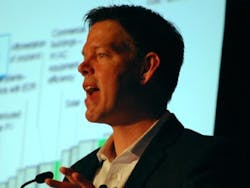Finally, Energy Efficiency's Day in the Sun
Improving energy efficiency has been on and off manufacturers' collective radar for decades. Opportunities abound, but it seems as if it's always just beyond the horizon as a significant attainment.
During a Wednesday morning presentation at ABB Automation and Power World this week in Orlando, Dan Vermeer of the Center for Energy, Development and the Global Environment at the Fuqua School of Business, Duke University, talked about existing and future opportunities in energy efficiency and highlighted some of the barriers that make this so hard to get done.
"If you look at the scope of energy demand we're facing over the next 20 years, we're expecting something on the order of a 45% increase between now and 2030," said Vermeer. "About one-third of that demand will be met by coal."
Energy consumption projections can be viewed with some skepticism, but we probably should count on that growth, said Vermeer, because "we're living larger than life." He somewhat tongue-in-cheek asked the audience to think of a person as an entity that needed energy, and what wattage would that person be. He said it's about 90 W for a person sleeping. It's perhaps 250 W for an active hunter-gatherer in a primitive tribal culture.
"We're not like that. In addition to energy to keep us moving around, we've assembled a whole series of energy-driven technologies and tools around ourselves, whether in our environment or the cell phones we carry, heating and cooling we rely on. So what would you guess is the wattage of the current North American person? How about 11,000 watts? That was sort of a eureka moment for me." Vermeer added that the rest of the world wants its condo, car and cell phone as well.
"The statistics are astronomical," continued Vermeer. "In the next decade, China is expected to add 40 billion square meters of floor space—or the equivalent of about 10 New York Cities or the size of Switzerland. In India it will be something like 14 to 18 billion square meters."
Vermeer said that 55% of the energy harvested from all sources is wasted. So recognizing that energy efficiency is a driver to mitigate climate change, security concerns and economic impacts, what do companies do to improve, since industrial efficiency is where half of the opportunities come from?
Vermeer outlined many of the drivers that influence a company's decision to become more energy-efficient, pointing to AT&T as doing more than most. The company hired a full-time energy director and set an aggressive same-year goal for 15% improvement in energy intensity, or its measurement of the number of kilowatts used per terabyte of data carried on its network.
For most companies, some strategy that includes a means to set goals, genuinely identify opportunities, finance the projects and have a commitment to implementation and measurement is among the necessary steps that Vermeer identified.
Regarding financing, an area where many energy-efficiency projects fail because they don't measure up to standardized ROI expectations, Vermeer said, "It will take extended payback periods, making sure that the eventual—however uncertain—costs of carbon emissions are taken into account, and the recognition that many of these projects have, in fact, lower associated risks than other investment alternatives. Some companies make capital set-asides specifically for energy-efficiency projects. DuPont did this and was blown away by the projects that came out of the woodwork because there were excellent returns that never made the cut in the normal process."
Implementation depends heavily on internal expertise and "champions" and making compensation and incentives real. "That establishes a clear cultural value," he said.
As energy efficiencies improve, beware the "Rebound Effect," warned Vermeer. "There's a paradoxical effect where energy efficiency drives more consumption," Vermeer said. "The classic example is vehicles, where the engine efficiency improvements were used to increase horsepower and vehicle size—the overall efficiency really didn't change very much."
Vermeer added that efficiency has to be part of a broader sustainability effort. "Efficiency buys time," Vermeer stated. "It slows the velocity, but doesn't change the overall direction."






